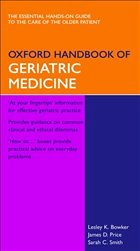The population is ageing, and most diseases are far more common in older people. Older people are particularly difficult to assess and to treat effectively, but are more vulnerable to therapeutic delays or errors. The Oxford Handbook of Geriatric Medicine provides user-friendly advice in a field that has limited evidence, yet makes up a substantial proportion of the work of most clinicians. It includes information required for effective, geriatric practice, in a contemporary, accessible format, indicating where practice differs from that of younger adults, is ill informed by evidence, and where dangers lurk for the inexperienced clinician. Guidance is given on the many ethical and clinical dilemmas common in geriatric practice, where several solutions may appear equally valid. Information ranges from when not to treat, through to providing evidence for where an aggressive approach is needed. Diseases that tend to arise mainly in older patients are covered in detail, as are problems that arise frequently, yet where advice is scarce. The text is problem based to assist the clinician in tackling scenarios where the diagnosis may not be clear. This is the 'must have' guide to geriatric medicine and will be invaluable to all those involved in the care of the older patient.
The population is ageing, and most diseases are far more common in older people. Older people are particularly difficult to assess and to treat effectively, but are more vulnerable to therapeutic delays or errors. The Oxford Handbook of Geriatric Medicine provides the information required for effective, geriatric practice in the contemporary, accessible Oxford Handbook format.
The population is ageing, and most diseases are far more common in older people. Older people are particularly difficult to assess and to treat effectively, but are more vulnerable to therapeutic delays or errors. The Oxford Handbook of Geriatric Medicine provides the information required for effective, geriatric practice in the contemporary, accessible Oxford Handbook format.

